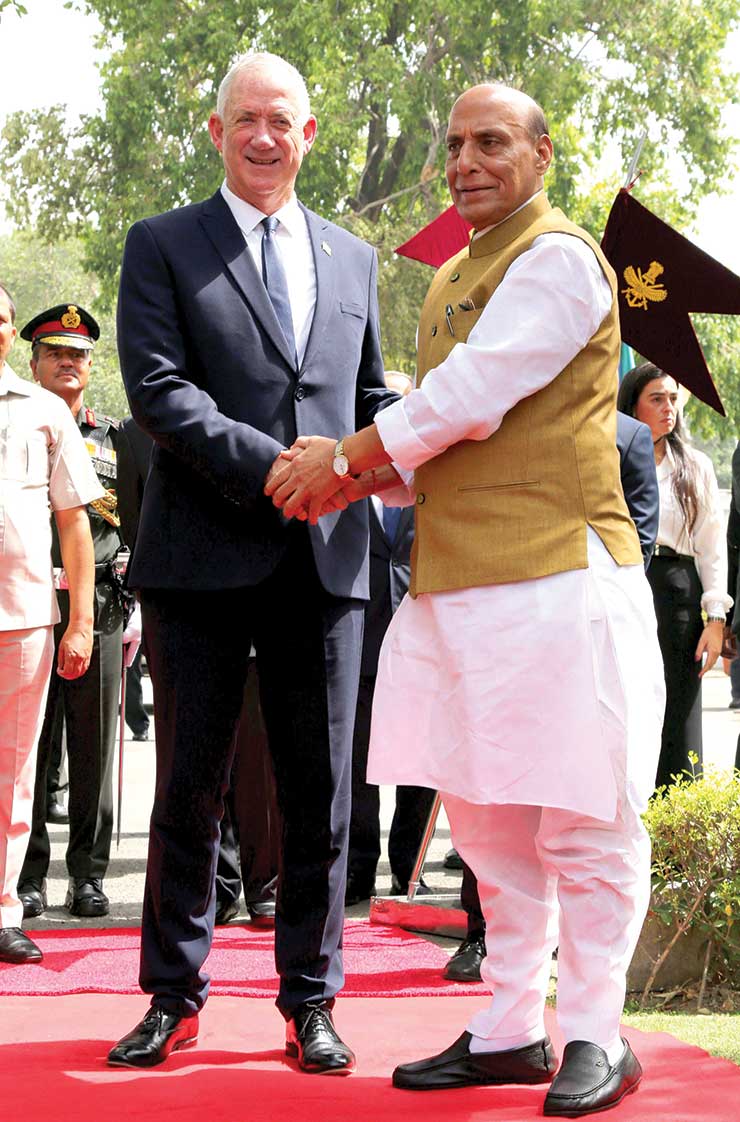 Three decades could be a short time for human life, but in international relations and military science, it is like ages. This is all the more evident in the relationship between India and Israel as the two countries are celebrating their 30th year of establishment of diplomatic ties. India and Israel are examples of being bound by civilisation, trade, commerce and more importantly people to people ties. Both countries are also bound by common threats of combating terrorism, separatism and the need to keep external and internal borders safe from foes inside as well as outside.
Three decades could be a short time for human life, but in international relations and military science, it is like ages. This is all the more evident in the relationship between India and Israel as the two countries are celebrating their 30th year of establishment of diplomatic ties. India and Israel are examples of being bound by civilisation, trade, commerce and more importantly people to people ties. Both countries are also bound by common threats of combating terrorism, separatism and the need to keep external and internal borders safe from foes inside as well as outside.
While India-Israel ties have grown by leaps and bounds, it is necessary to understand the various dimensions of the flourishing bilateral ties. One very dynamic sector, which has seen a proliferation in the last three decades, is the defence sector.
The defence sector globally has seen a colossal growth ever since the time of the cold war. The end of the cold war and the emergence of new ideas and modes of threats have seen nation-states around the world bolster their defence spending. In this context, India and Israel are no different. Israel was formed in 1948 by the United Nations by dividing Palestine. Since then, the Jewish nation-state has been surrounded by countries that have been historically antagonists to the Jewish state, and have vowed to annihilate Israel. But after the 1947-48 Arab-Israel war, Israel has grown in strength. One of the cornerstones of this power has been the vibrant defence sector of the country.
Israel is undoubtedly a defence superpower. The Israeli armed forces have spent over $6 billion on the procurement of defence goods, which includes several state-of-the-art weapons systems such as drones and Lethal Autonomous weapon systems. It is the only country in the Middle East that boasts of a sufficiently strong nuclear arsenal. Further, Israel is a cyber superpower. It has demonstrated its capability several times to defend the sovereignty of the country in cyberspace. The focus of this article is to provide insights into the future roadmap this defence relationship will be embarking on.
Depth of defence partnership
It is necessary to understand the depth of Indo-Israel defence cooperation. Israel is the third largest military equipment exporter to India. Over the years, Israel has exported defence goods to India to the tune of $2.9 billion. The main purchases included missiles, radars and UAVs. The Indian armed forces rely heavily on Israeli Searcher and Heron UAVs to meet their surveillance requirements with a growing need for more. In the backdrop of the standoff with China in eastern Ladakh last year, the Indian military leased four heron medium altitude surveillance drones from the Israel Aircraft Industries, which have since been inducted.
In the second half of last year, the Indian military also placed orders for smaller, yet potentially lethal, ‘Sky Striker drones to be manufactured in Bengaluru by a joint venture between Israel’s Elbit System and India’s Alpha Design Technologies, which is now part of Adani Group.
The future roadmap
Having stated the depth of the Indo-Israel defence partnership, it is now necessary to understand the future roadmap of this defence relationship. One of the key areas where India and Israel can collaborate is the cyberspace sector. India is an IT superpower. It is also ranked third in the world on the Hurun start-up rankings in terms of new and innovative start-ups. Israel is slowly coming up as a new potent country. The focus of cyberspace can be on extending cooperation in protecting and preserving vital infrastructures such as power grids, power plants, and critical military installations such as nuclear assets, including missiles and reactors. Another key area of this cyberspace cooperation is to ensure protection against threats from external actors, both state and non-state actors. In the recent past, India has faced cyberspace threats from Chinese hackers who were responsible for hacking into the grid system of Mumbai causing a power outage in the financial capital of India and making nefarious hacking attempts in other parts of India as well in various other sectors. Israel can with its solid defensive cyberspace capabilities provide help to India to bolster the protection of its critical assets.
Another key area is the realm of artificial intelligence. AI is the new buzzword in the area of defence and military intelligence. Countries such as the USA, Russia and Israel are making increasing use of these AI-based weapons. One such example is the T-14 Armata Main Battle Tank of Russia. The manifestation of this Artificial Intelligence-based weapon is the Lethal Autonomous Weapons Systems (LAWS), which include the autonomous Unmanned Aerial Vehicles, not the ones used only for surveillance but the ones that contain weapons – the ‘hunter killer’ ones, which will be unmanned in the future. Israel is again a leader in such types of weapons. Israel made use of a modern automatic sniper rifle remotely controlled to assassinate top Iranian nuclear scientist Mohsin Fakhrizadeh this year.

While this may appear to be a source of potential discomfiture for the dovish people yet from the security point of view, it is a new excellent source of futuristic defence cooperation between Israel and India. India has been plagued by terrorism emanating from Pakistani soil for decades and such weapons meant strictly for the self-defence of the country are absolutely essential for defending the sovereignty of the country. Therefore, the Defence Acquisition Council (DAC) and the Cabinet Committee on Security (CCS) should positively consider working in these areas to bolster the future of this vibrant relationship.
The Joint Working Group
Another sign of the deepening cooperation of both the countries is a recent new development – the establishment of a task force that will work to identify new areas of defence cooperation. The Joint Working Group will chalk out a new strategic vision for intensifying defence cooperation between India and Israel in the long term period.
To realise the true potential of this partnership, what is needed now is the identification of mutually-beneficial technologies and greater engagement between their respective innovation ecosystems. This will create a sustainable path for collaboration between the two tech-savvy democracies. Promoting start-ups in the defence sector around technologies such as AI-based weapons, the offensive as well as defensive cyberspace capabilities are essential.
Space is another area where India and Israel can collaborate. India is a great space power and is only the fourth country in the world to have the ability to destroy satellites. The future defence cooperation could be to strengthen Indo-Israel space defence and offence technologies.
Conclusion
India and Israel are on the verge of making history. The ongoing war in Ukraine has highlighted the need for India to become self-reliant. However, self-reliance should mean promoting synergy in defence ties and not inward-looking defence development.
– The writer is currently working as a Research Associate at Defence Research and Studies (dras.in) and is a columnist. The views expressed are personal and do not necessarily reflect the views of Raksha Anirveda
–The writer is currently working as a Research Associate at Defence Research and Studies (dras.in) and is a columnist. The views expressed are personal and do not necessarily reflect the views of Raksha Anirveda






